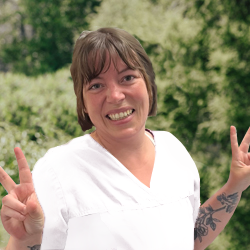We are passionate about helping kids and babies as early in life as possible. To establish proper habits in our children we have to start young. How young you ask? Ideally even before birth. Oral tissues start forming very early on in pregnancy. At 10 weeks our upper jaw starts forming and the habit of swallowing and sucking starts. Once a baby is born and takes its first breath, the swallowing and sucking action is key to survival and life.
 Many things to consider and assess during the first months of life.
Many things to consider and assess during the first months of life.
- While your baby is awake, are their lips apart? Do they have chronic runny or congested nose?
- While your baby is sleeping, is their mouth open? Do they snore? Can they only sleep upright or when held?
- Are mom or baby having trouble breastfeeding? Is their difficulty achieving a good latch?
Many of these issues can be addressed and once resolved can be a great opportunity to improve the growth, development and function of your child. We love working with simple oral appliances like the MyoMunchee and the Myochew. When these appliances are used, babies are not able to breathe through their mouth, so they actively start nasal breathing. This helps achieve jaw health and development as early as 6months! They also learn how to coordinate chew-swallow-breathe which is a neurological pattern we use for life.
Baby teeth start to erupt through the gums between four and nine months of age. Ten upper and ten lower for a total of twenty.
This first set of teeth helps your child eat, speak, and help the adult teeth come in straight. Even tiny teeth must be cleaned. Infants can get cavities just like older children and adults. Following all feedings, you should clean your baby’s mouth and teeth. If the teeth are not large enough for an infant toothbrush, then simply use a piece of gauze or a wet facecloth to wipe their teeth and gums. This prepares babies early for what should become a lifelong habit.
Your baby’s first visit to the dentist can occur when the first teeth appear. The early visit can help detect any differences from normal growth patterns.
Book an Appointment with us
Back to our services

 Many things to consider and assess during the first months of life.
Many things to consider and assess during the first months of life.






